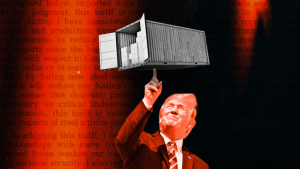Uncertainty Overshadows Trump’s Economic Promises
President Donald Trump’s economic agenda, once hailed for attracting corporate investments, is now being questioned due to his erratic trade policies. Instead of encouraging growth, this unpredictable trade war may be undermining investor confidence and discouraging long-term planning by businesses.
With the global economy on edge, CEOs are finding it increasingly difficult to commit to large-scale projects in the U.S., especially when policy decisions lack clarity and consistency.
A New Era of Economic Instability
In today’s volatile environment, businesses face more questions than answers. Market reactions have been severe—stock markets have seen dramatic swings, trade tensions are escalating, and consumer confidence is plummeting.
“This uncertainty could stall investment instead of promoting it,” said John Graham, finance professor at Duke University.
Executives are hesitant to hire new workers or expand operations when they can’t predict the next set of tariffs or policy changes. The lack of economic direction is stalling progress across industries.
Tariff Fears Echo Historical Mistakes
Former Federal Reserve Bank of St. Louis President James Bullard warned of the risk of repeating the Smoot-Hawley Tariff Act of the 1930s—a move that worsened the Great Depression. Just like then, foreign retaliation and decreased U.S. imports could damage global trade.
“Who wants to invest when rules could change overnight?” Bullard asked.
Mary Lovely, senior fellow at the Peterson Institute for International Economics, emphasized that without knowing whether tariffs are temporary or permanent, companies can’t develop strategic investment plans.
Even Supporters Are Raising Concerns
Even key Trump allies, such as billionaire investor Bill Ackman, have voiced worries over the growing economic chaos. Though he supports addressing unfair global trade practices, Ackman criticized the administration for launching a broad trade conflict with allies and rivals alike.
“We are destroying confidence in the U.S. as a reliable trading partner,” Ackman warned on X (formerly Twitter).
Businesses are now struggling to calculate production costs, as they don’t know if tariffs on imports from Mexico or China will be 0% or soar to 50%. On top of that, the risk of retaliatory tariffs makes demand forecasts even murkier.
Markets React to Policy Chaos
While Wall Street and Main Street differ, they are tightly interconnected. The stock market decline triggered by trade fears has real-world consequences: reduced investments, lower consumer spending, and potential job cuts.
“When markets crash, businesses halt spending and start layoffs,” Ackman added.
The ongoing turbulence also makes it difficult to predict currency values, further complicating investment decisions for multinational corporations.
Energy Industry Calls for Stability
Even the oil and energy sector, which has long backed Trump’s deregulatory stance, is showing signs of frustration. Promises of energy independence and low fuel prices have been drowned out by policy unpredictability.
“The administration’s chaos is a disaster for commodity markets,” said one oil executive in a survey by the Dallas Federal Reserve.
The executive criticized the lack of clear objectives behind tariff policies, calling for greater policy stability to support future growth.
Final Thoughts: Business Needs Predictability
The current climate of economic uncertainty is proving detrimental to business growth. CEOs, investors, and global markets are sending a clear message: stability, transparency, and strategic direction are essential for driving American industry forward.
Unless there is a course correction, the long-term impact of Trump’s trade war could be more damaging than beneficial for the U.S. economy.









